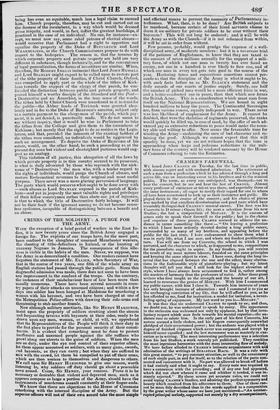CRIMES OF THE SOLDIERY: A PURGE FOR THE ARMY.
WITH the exception of a brief period of warfare in the East In- dies, it is now twenty years since the British Army engaged a foreign foe. The exploits of our troops have, for the most part, been confined to the slaughter of unarmed Manchester weavers, the shooting of tithe-defaulters in Ireland, or the hunting of runaway Negroes in Jamaica. The consequence of this idle- ness is visible in the habits of the men. Never, we suppose, was the Army in so demoralized a condition. Our readers cannot have forgotten the statement of Mr. ELLICE, when Secretary of War, that in the course of two years, one fifth of the whole army on English stations had passed through the public gaols. Since this disgraceful admission was made, there does not seem to have been any improvement in the conduct of the troops. On the contrary, the instances of their misbehaviour have of late been more than usually nnmerous. There have been several accounts in coun- try papers of their attacks on unarmed citizens; and within a few days one soldier has been hanged at Maidstone for murdering a woman with his bayonet, and two have been charged at one of the Metropolitian Police-offices with drawing their side-arms and threatening to stab another female.
Now although military martinets, like Sir HENRY HARDINGE, insist upon the propriety of soldiers strutting about the streets and frequenting taverns with bayonets at their sides, ready to be drawn upon any man, woman, or child, at will, we apprehend that the Representatives of the People will think it their duty in the first place to provide for the personal security of their consti-
tuents. It is evident that something must be done to protect inoffensive and unarmed people against the idle ruffians who prowl along our streets in the guise of soldiers. When the men are on duty, under the eye and control of their superior officer, let them appear accoutred as soldiers, with as many guns, swords, and bayonets, as they can carry ; but when they are suffered to mix with the crowd, kit them be compelled to put off their arms, which are then useless to themselves and dangerous to others. We call upon Sir HENRY HARDINGE to give one reason, worth listening to, why soldiers off duty should go about a peaceable town armed. Come, Sir HENRY, your reasons. Prove it to be necessary or desirable that violent and depraved men, such as it appears compose so large a portion of the Army, should have the instruments of murderous assault constantly at their finger-ends.
We know that there are objections to the House of Commons interfering with the internal discipline of the Army. But the superior officers will not of their own accord take the most simple
and effectual means to prevent the necessity is' Parliamentary in-- terference. What, then, is to be done? Are British subjects to be murdered, because certain of their hired servants choose to deem it un-military for private soldiers to be ever without their bayonets? This will not long be endured; and it wiil be with the Army as with the Church—if it is not reformed from within, it will be set in order from without.
Few persons, probably, would grudge the expense of a well- disciplined army, of moderate numbers : but it is a too severe trial of the patience of Englishmen, to know that they are taxed to the amount of seven millions annually for the support of a mili- tary force, of which not one man in twenty has ever faced an enemy, not one in a hundred is ever likely to face one, and of which one man in every ten gets into gaol in the course of the year. Hectoring tones and supercilious assertions cannot per- suade us that the discipline of the Army is what it ought to be, with such facts before us as Mr. ELLICE'S statement and the daily records of our courts of justice supply. Surely, one half the number of picked men would be a more efficient force in war, and a better-conducted one in peace, than that which now forms the British Army. This is a consideration which must soon force itself on the National Representatives. We are bound in eight hundred millions to keep the peace. The Continental Sovereigns are, from various causes, equally indisposed to war. There never was less likelihood of employment tor the Army. It cannot be doubted, that were the skeletons of regiments preserved, the ranks would quickly be filled up, in case of need, by the offer of such ad- vanced pay as extensive reductions in peace would make the coun- try able and willing to offer. Now seems the favourable time for weeding the Army—cashiering the men of bad character and re- taining the good. Although we cannot expect that this will speedily be done, yet we are not without hopes that the time is approaching when large and judicious reductions in the mili- tary force of the country will be rendered necessary by the House of Commons refusing to vote the Estimates.


























 Previous page
Previous page